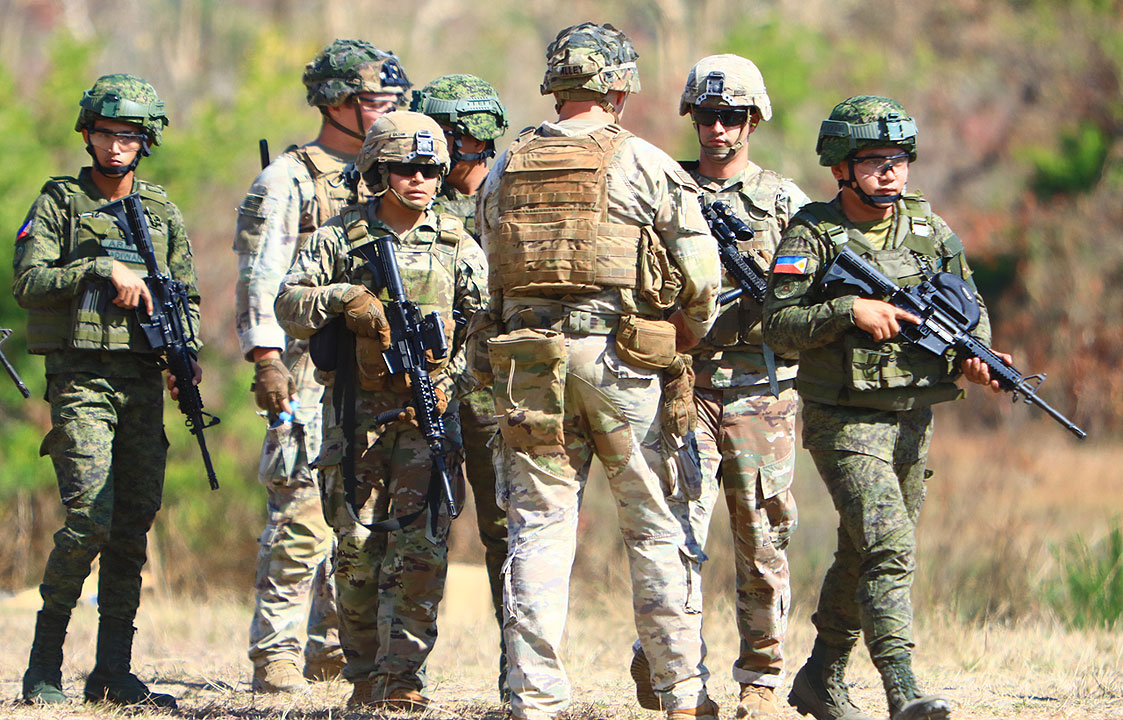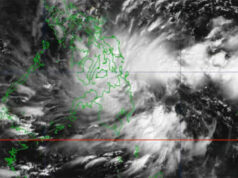China reverts to swarming tactics; US admiral eyes more EDCA bases

By Kyle Aristophere T. Atienza, Reporter
THE ARMED Forces of the Philippines (AFP) reported the “concerning resurgence” of China’s swarming tactics within Philippine boundaries of the South China Sea on Thursday, as a top United States admiral eyed access to more bases in the country under the Enhanced Defense Cooperation Agreement (EDCA).
Citing its air patrols on Sept. 6 to 7, the AFP Western Command said three areas within the country’s exclusive economic zone (EEZ) in the South China Sea have experienced “heightened China swarming activity.”
The biggest swarming — involving 23 supposed fishing vessels of China — was spotted in Iroquios Reef (named Rozul Reef by the Philippines), which is located south of oil- and gas-rich Reed Bank, the AFP WESCOM reported.
“Additional swarming was observed in Escoda (Sabina) Shoal, where five Chinese fishing vessels were present, and in Baragatan (Nares) Bank, with two Chinese fishing vessels recorded,” it added.
The military stressed that such swarming activity by China has implications on the Philippines’ “maritime security, fisheries conservation, territorial integrity, and preservation of the maritime environment.”
“These activities have been a source of tension in the West Philippine Sea (covering the country’s EEZ) and contributed to instability in the region,” the AFP WESCOM statement said.
Last Aug. 24, the Philippine Navy reported that 33 Chinese fishing vessels were also spotted swarming Iroquios Reef. “Previous swarming incidents in the area have also been followed by reports of massive coral harvesting,” the military said.
The latest Chinese swarming activity was reported days after the Chinese Coast Guard, backed by Beijing’s maritime militia and navy vessels, attempted to block a Philippine resupply mission to Second Thomas Shoal (Ayungin Shoal) through dangerous maneuvers.
“Another thing worth noting with the last resupply mission, it has become more obvious that the Chinese maritime militia is now taking orders from the Chinese Coast Guard to actively block the entrance of Philippine vessels,” Philippine Coast Guard spokesman for the West Philippine Sea Jay Tarriela said in a television interview Thursday.
“Before, these Chinese maritime vessels were very covert in taking orders from the Chinese Coast Guard. Now, it’s very obvious,” Mr. Tariela said.
MORE US ACCESS TO PHL BASES RECOMMENDED
Meanwhile, the United States may seek access to more military bases in the Philippines under EDCA, according to the chief of the US Indo-Pacific command.
The Philippines has this year increased the number of bases accessible to the US military from five to nine, a move that has riled regional power China, which sees the arrangement as provocative and likely to raise tensions.
On Thursday, Admiral John Aquilino said he and AFP Chief of Staff Romeo Brawner, Jr. had discussed further expanding the number of bases US forces could access under the defense and security agreement between the two countries.
“General Brawner and I made recommendations to our senior leaders for the consideration of additional sites, but there’s still work to do there,” Mr. Aquilino said, stressing that the US was operating in the country at the invitation of the Philippines.
The closer US defense ties with the Philippines after a period of decline has caused concern in China that Washington has Taiwan in mind in its efforts to boost its military presence in the region.
The United States says it intends to bolster an already strong alliance and improve the defense capability of the Philippines.
Mr. Brawner said the purpose of EDCA was training exercises and humanitarian and disaster response, key planks of a decades-old alliance between the two countries, and not related to regional security threats.
“All of these joint operations, even the selection of our EDCA sites, have nothing to do with the other countries in the Indo- Pacific region, meaning the threats that could come out from these countries,” he said.
Mr. Aquilino also said the two countries were seeking to complete an agreement on boosting their intelligence sharing.
DFA: PHL LAWS NEEDED TO DEFINE TERRITORY
In the Philippine Congress, lawmakers are busy enacting laws establishing the country’s maritime zones and defining boundaries — all crucial in cementing Manila’s position to exercise economic rights in the South China Sea in line with international law, the Department of Foreign Affairs (DFA) said.
“These laws will establish the rights and duties of the Philippines as an archipelagic state including areas where the Philippines can exercise sovereignty and jurisdiction,” Foreign Affairs Undersecretary Eduardo A. de Vega told a Senate Special Committee on Maritime and Admiralty Zones on Thursday.
“The establishment of the maritime zones would provide the necessary foundation and framework for the enactment of subsequent laws pertinent to the rights and obligations of the Philippines over our maritime zones,” Mr. De Vega said.
Gregory B. Poling, director of the Southeast Asia Program and Asia Maritime Transparency initiative at the Center for Strategic and International Studies, told the same hearing that Manila’s claims over the disputed waterway are already well grounded on international law.
“Elaborating that in domestic legislation only further clarifies the issue,” he said. “It doesn’t change the Philippines’ claims.”— with John Victor D. Ordoñez and Reuters



